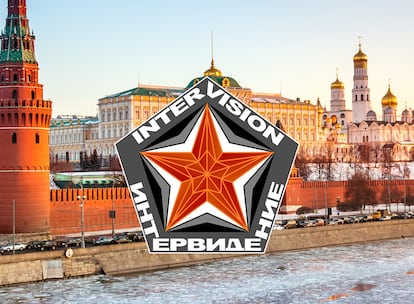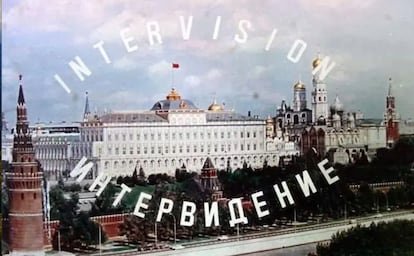Cognac, moles and Catalan rumba: Intervision, the communist version of Eurovision
Russia’s minister of culture has announced plans to bring back this contest, which has intermittently brought musicians from the other side of the Iron Curtain (and some from this side) together to compete since the 1960s

Is the Eurovision Song Contest political? The question has no clear answer. Or it does, depending on who you ask. European Broadcasting Union (EBU) regulations call the contest a “non-political event,” but politics have crept into it in an underhand and unavoidable way since Eurovision’s inception. Ukraine’s victory in 2022 was the product of a massive vote of support and sympathy for the country following Russia’s invasion. And the huge controversy this year over Israel’s participation amid its attacks on Palestine shows that for millions of fans it is not easy to separate the songs from life.
Russia, which made its Eurovision debut in 1994 and was suspended in 2022 after the invasion of Ukraine, does not want to be left out. In November, the Russian Culture Ministry announced a plan to bring back the Intervision Song Contest, the socialist alternative to Eurovision organized by countries behind the Iron Curtain during the Cold War beginning in 1965, nine years after Eurovision.
“The idea of Intervision was born in Czechoslovakia in the early 1960s,” Dean Vuletic explains from Luxembourg. “It was a way to promote cooperation between East and West.” Vuletic is a historian focusing on contemporary Europe and a pioneer in the academic study of Eurovision, with several books on the cultural and historical impact of the festival, such as Postwar Europe and the Eurovision Song Contest.
The University of Luxembourg scholar explains that the socialist bloc countries originally expressed their interest in participating in Eurovision to the European Broadcasting Union, but EUR’s rejection gave rise to the idea of an indigenous song festival behind the Iron Curtain. “There were two versions of Intervision. One iteration in Czechoslovakia from 1965 to 1968 and the next edition, in Poland, which ran from 1977 to 1980. Almost always, when talking about Intervision, people tend to focus on the Polish version,” says Vuletic.

While the version broadcast from Prague was not as emblematic as its Polish successor, there were memorable moments and participants. “Spain participated in 1968 through Salomé,” says Vuletic, who says he reviewed Spanish Foreign Ministry archives to understand what the Franco regime’s motives were for sending Salomé to Czechoslovakia. “The only thing I could find is that it was a period when Spain was trying to normalize relations with Eastern Europe.”
Salomé came in third place at the 1968 Intervision festival, Vuletic says. A year later at Madrid’s Teatro Real [Royal Theater], she placed first in Eurovision with Vivo cantando [I’m Always Singing] in a four-way tie with Lulu (UK), Frida Boccara (France), and Lenny Kuhr (Netherlands). Claudia Fernández, a cultural journalist and Eurovision expert, explains that Spain’s participation in the EBU-organized festival — despite being criticized by some participants for admitting a country that lived under a dictatorship — symbolized the beginning of the end of the country’s isolation under Francisco Franco’s regime. “Starting at Eurovision could have given hope to initiate the opening of this country,” the journalist says.
Catalan rumba on the Polish coast
Władysław Szpilman was a prestigious musician and composer who headed Radio Poland’s Popular Music Department. The story of how he survived World War II was made into a film by Roman Polanski in The Pianist, in which Adrien Brody plays the Pole. It is not as well known that in 1961 Szpilman founded the Sopot International Song Festival, a sort of San Remo on the Baltic Sea, which continues to this day. In 1977, that contest was replaced by the second version of the Intervision Song Festival, held at the same venue: the open-air amphitheater of Sopot’s Lesna Opera House.
“I think the second version sought to be more global,” says Vuletic, “with participants from outside Europe, for example from Cuba.” Switzerland, Finland, Canada, and the Netherlands were also represented. However, Spain stands out for having been the only nation from the liberal and (more or less) democratic West to participate in all four editions of Intervision in its Polish version, from 1977 to 1980.
The Catalan group Rumba Tres, formed by brothers Juan and Pedro Capdevila and José Sardaña, competed in Sopot for Spain in 1978. “It was an incredible moment in our career that we remember with great affection,” the musician recalls over the phone. “Televisión Española [Spanish Television] suggested that we go to the festival, apparently they were in contact with Polish television and needed Spanish representation. It was us and [singer] Juan Erasmo Mochi.” “The festival was awesome, and the people were wonderful. We had at least forty or fifty musicians,” the Catalan adds.
“I expected that in Poland, people would be rather cold because of the system they lived in,” Capdevila says. But he asserts that the audience was enthusiastic about the Catalan rumba. The musician observes that the group even won an award from the Polish press, radio and television for their interpretation of No sé, no sé [I Don’t Know, I Don’t Know]. The polarization of the Cold War was not a problem. “When we got there it was communism, to call it that. But what we did was rehearse and introduce ourselves on television, and they were wonderful with us,” Capdevila emphasizes. “We have always been quite apolitical. We didn’t want to mix music with politics, although it’s impossible to leave everything out. What we found out later, from musician friends of ours, is that there was a mole. But since he saw that we were only concerned with the music and the rest was of no interest to us, they never said anything to us. Someone always went with you and you wore a badge so that they knew you were a foreigner. In the hotel they only let in people from the festival. We would meet people on the street and go to the hotel and bribe the doormen, we would say: ‘I’ll buy you a cognac later!”
“Another element in Sopot [was] the introduction of a parallel competition for record labels,” Vuletic adds. “This other competition included companies and artists from Western Europe and the United States who were left out of the contest and, interestingly, made the communist Intervision more commercial than the capitalist Eurovision. In the late 1970s there was a debate in the Eurovision organization about whether private capital had too much influence in the festival, given that it was organized by public broadcasters. There was concern that the record labels had more weight than some of the smaller countries’ musical offerings.” Intervision got to the root of the problem and solved it by giving them their own competition.
Rasputin and Vladimir
Some guest artists from the capitalist West who participated in this iteration of Intervision included American country singer Johnny Cash, French chanson ambassador Charles Aznavour, and Boney M, who performed... Rasputin.
However, the socialist event was not impervious to the political realities that were shaking up Eastern Europe in the 1980s. “The festival was brought to an end by the rise of the Solidarity movement and the imposition of martial law in Poland,” Vuletic recounts. While Intervision 1980 was taking place at the Lesna Opera House in Sopot, the nearby Gdansk shipyard was witnessing a strike led by Lech Walesa that would mark the beginning of the end of communist rule in Poland. There would be no Intervision in 1981 or the years that followed. Eventually, the festival founded by Władysław Szpilman would return, but no longer under the name Intervision. Today it is one of the most important music competitions in Central Europe and the most important in Poland.
In 2008, Russia tried to bring back the Intervision Song Festival. As Reuters reported at the time, Russian Prime Minister Vladimir Putin was one of those nostalgically calling for its return. The setting for this version of Intervision was Sochi, in southern Russia. Unlike previous iterations, participation in this contest was limited to former Soviet republics only. 11 countries participated (it was originally supposed to be 12, but Georgia backed out because of the armed conflict with Russia that year) and Tajikistan emerged as the winner. The competition did not continue in subsequent years.
Vuletic has a theory about the transience of this first version of the contest in the 21st century. “I think Russia was investing a lot of resources in Eurovision and it was not getting the results they expected and that was one reason for reviving the festival,” the historian points out. “It just so happens that 2008 is when they won with Dima Bilan and that’s when they lost interest in Intervision.”
That did not end the problems between Moscow and the EBU-organized contest. The event’s popularity among the LGBTQ community and Ukraine’s use of the contest to criticize the Kremlin after the 2014 invasion of Crimea (they won in 2016 with the song 1944 by Jamala, with lyrics about the deportation of Crimean Tatars in the 1940s) were two major sticking points for Russia before its suspension in 2022, Vuletic says. In November 2023, Russian Culture Minister Olga Liubimova revealed the desire to bring Intervision back once again.
According to Vuletic, bringing back the contest as originally planned is impossible. “The Russians are wrong to revive Intervision, because they assume it was a Soviet idea born out of the Cold War,” Vuletic argues. “But it was an initiative first spearheaded by Czechoslovakia and then by Poland, and both times it reflected an attitude of openness toward the West and Western cultural influences.”
“The organizers always claim that Eurovision is not a political event and that the performances should not have political messages,” he adds. “But it’s very difficult to control because everything can be political. I think, for the EBU, there is good politics and bad politics. The good politics are the values of diversity and inclusion, and they have become values of the Song Contest itself.”
Spanish journalist Claudia Fernandez believes that the music festival born while Europe was rebuilding itself amid the ruins of World War II served as a means to pursue the ideal of peaceful coexistence. “Eurovision is a song contest between countries, and politics is intrinsic to the existence of countries,” Fernandez argues. “When people try to make me angry by telling me that Eurovision is political, I respond with a resounding: of course it is.”
Sign up for our weekly newsletter to get more English-language news coverage from EL PAÍS USA Edition
Tu suscripción se está usando en otro dispositivo
¿Quieres añadir otro usuario a tu suscripción?
Si continúas leyendo en este dispositivo, no se podrá leer en el otro.
FlechaTu suscripción se está usando en otro dispositivo y solo puedes acceder a EL PAÍS desde un dispositivo a la vez.
Si quieres compartir tu cuenta, cambia tu suscripción a la modalidad Premium, así podrás añadir otro usuario. Cada uno accederá con su propia cuenta de email, lo que os permitirá personalizar vuestra experiencia en EL PAÍS.
¿Tienes una suscripción de empresa? Accede aquí para contratar más cuentas.
En el caso de no saber quién está usando tu cuenta, te recomendamos cambiar tu contraseña aquí.
Si decides continuar compartiendo tu cuenta, este mensaje se mostrará en tu dispositivo y en el de la otra persona que está usando tu cuenta de forma indefinida, afectando a tu experiencia de lectura. Puedes consultar aquí los términos y condiciones de la suscripción digital.








































